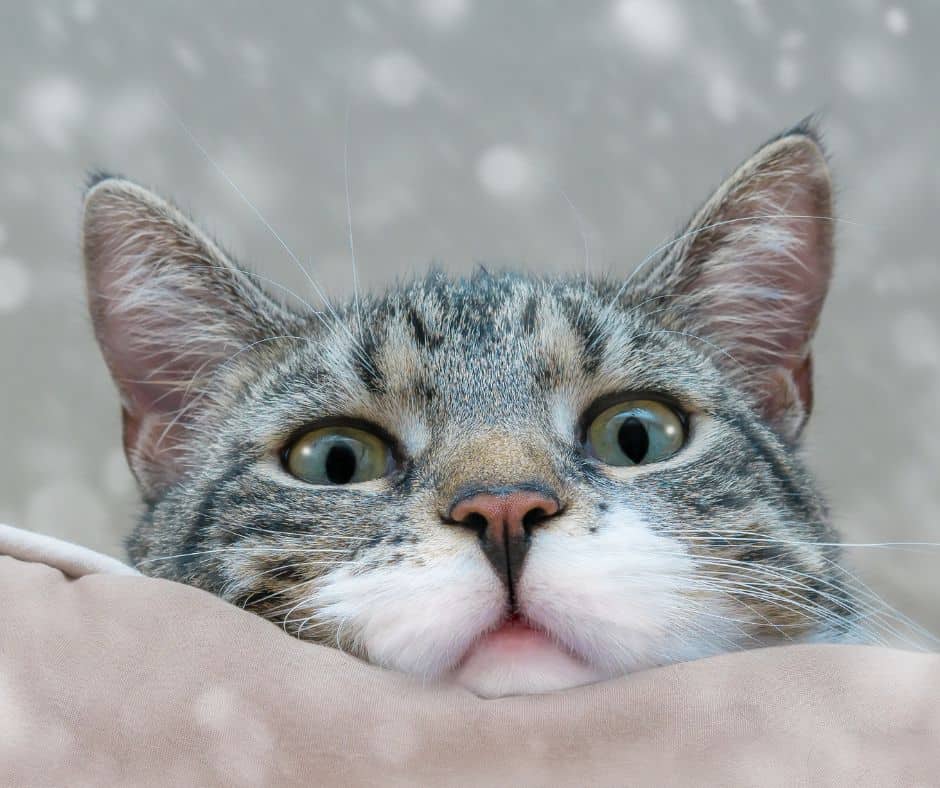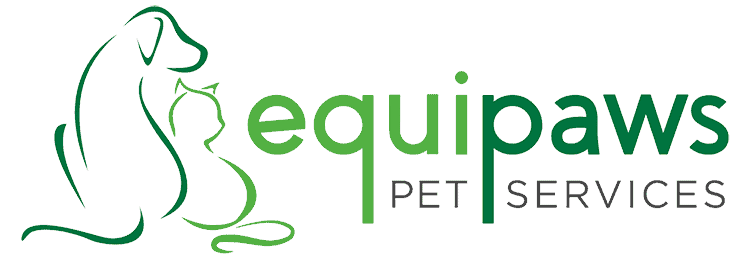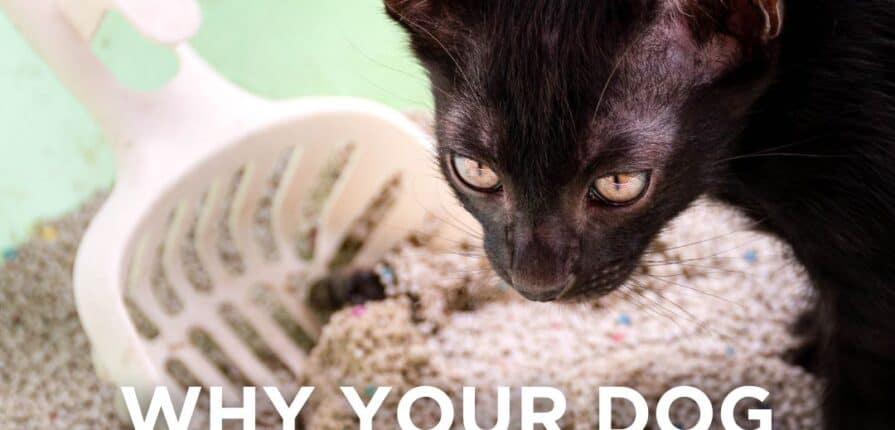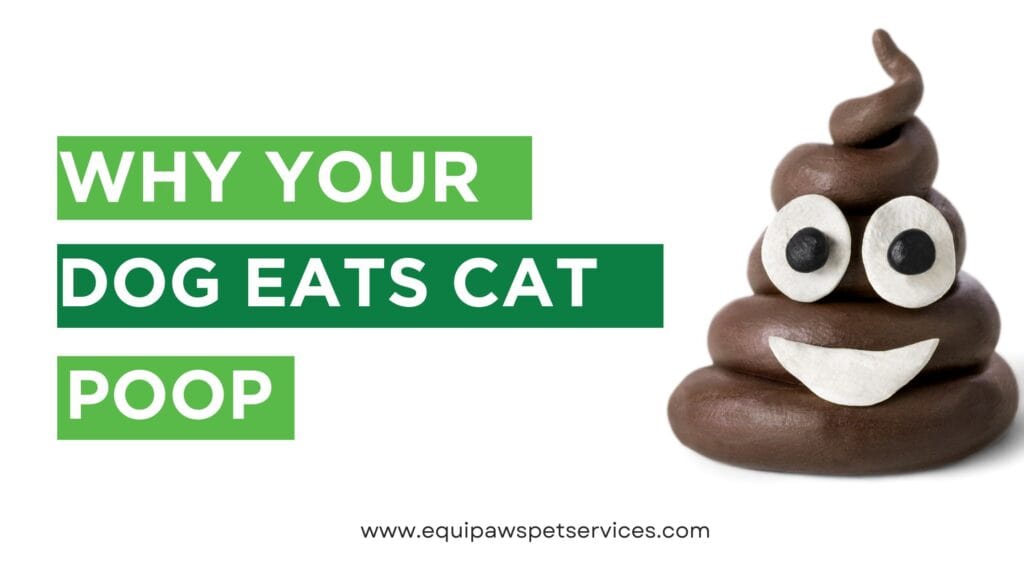How to Keep Your Dog From Eating Cat Poop
Have you always wondered why dogs seem to enjoy feasting on litter box delicacies? Whatever the reason, it’s clear that our furry friends have a unique fascination with the contents of litter boxes. As unappealing as it may seem to us humans, it’s just another day in the life of a dog!
What Is Coprophagia’s Origins
Coprophagia is the scientific term for consuming feces, which is common in dogs. A dog’s tendency to eat fresh stools is an inherited behavior from their wild ancestors, which helped protect pack members from intestinal parasites that might be present in feces in their den or rest area. Simply put, dogs are naturally inclined to eat poop due to their genetic makeup.
It can be a tough habit to break, but with consistent attention and care, dogs can be trained to stop eating litter box poop. It will take patience and persistence, but pet parents CAN help their dogs overcome this unhealthy behavior and develop better habits.
Understanding Why Dogs Eat Poop
Coprophagia can be caused by a combination of behavioral and physiological factors. Coprophagia may be an evolved behavior that helped animals survive during periods of starvation, says Dr. Benjamin Hart, from the University of California at the American Veterinary Society of Animal Behavior annual conference. When puppies eat poop, it is generally considered to be part of the process of exploring the world around them. Bottom line: it is a completely normal behavior for dogs and other species to eat poop.
Common Reasons Dogs Eat Cat Poop
- Dogs are attracted to the taste and smell of cat poop
- Some experts say it’s due to nutritional deficiencies or malabsorption issues
- Cleanliness instinct, especially in their territory or bedding.
- Behavioral aspects such as boredom or the instinct to hide evidence of presence.
Is Cat Poop Dangerous for Dogs?
Eating cat poop can be dangerous for dogs and, thus, humans (especially if you let them lick your face!). Dogs could become infected with intestinal parasites like hookworm or bacterial infections like salmonella. Just as dangerous, ingesting too much kitty litter can cause intestinal blockages, a potentially life-threatening situation.
How Can You Keep Your Dogs Away from Cat Litter?
1. Keep Your Cat’s Litter Box Clean
Regularly cleaning your cat’s litter box is crucial to preventing your dog from eating out of it. Dogs are often attracted to the scent and taste of cat feces, which can lead to unhealthy coprophagia behavior. If the litter box is not kept clean, your dog may see it as an opportunity to snack on the waste, causing potential health risks for your dog. You can remove any waste and odors that might attract your dog by scooping the litter box daily. This simple habit can help prevent unwanted snacking and keep your pets healthier and happier. Have a busy schedule? Another alternative is hiring a professional pet sitter, like Equipaws. ___
2. Keep Your Cat’s Litter Box Covered and Away from Dogs
Using covered litter boxes or placing them in areas inaccessible to dogs is a clever way to prevent your furry friend from snacking on cat poop. Covered litter boxes have a hood or top that prevents dogs from accessing the contents. This keeps your dog from eating something unsavory and helps maintain your cat’s privacy and keeps the litter box clean. It’s a simple yet effective solution to keep both your cat and dog happy and healthy. You can also use a dog gate to separate dogs from tempting cat litterboxes or put your litterboxes in a closed room and add a cat door.
3. Use Behavioral Training to Keep Your Dog from Eating Cat Poop
Training your dog to obey commands that discourage them from approaching the litter box is a great way to prevent unwanted snacking. By teaching your dog to stay away from the litter box area, you can create a safe and clean environment for both pets. Consistent training and positive reinforcement can help your dog understand that the litter box is off-limits, reducing the likelihood of unwanted exploration.
Positive reinforcement techniques can be a powerful tool to prevent dogs from eating out of a litter box. By rewarding your dog with treats and praise when they ignore or avoid the litter box, you can teach them that good things come from leaving it alone. With positive reinforcement, you can encourage your dog to steer clear of the litter box and develop a cleaner and healthier relationship with your feline friend.
4. Environmental Enrichment to Redirect Your Dog Away from Eating Cat Poop
Providing toys and engaging activities to reduce boredom. Providing toys and engaging activities can be vital in preventing dogs from eating out of a litter box. Dogs often resort to undesirable behaviors like coprophagia due to boredom and lack of stimulation. By offering a variety of interactive toys and engaging activities, such as puzzle toys, chews, and playtime, you can keep your dog mentally and physically stimulated, reducing the likelihood of them seeking out the litter box.
5. Give Your Dog Exercise and Attention
Ensuring adequate exercise and playtime. Physical activity and mental stimulation can help reduce boredom and excess energy. Regular walks, runs, or playtime in the yard or park can satisfy your dog’s natural instinct to explore and expend energy. By meeting your dog’s exercise and playtime needs, you can help redirect their attention away from the litter box and foster a healthier and happier relationship between your dog and cat.
We also have a blog post that covers seven natural ways to stop your dog from eating poop that can help.
Consultation with a Veterinarian
If nothing works and your dog continues to eat cat poop, you need to consult with your veterinarian to determine if there are any underlying health issues. At the very least, they can check to ensure your dog hasn’t contracted parasites from eating kitty litter. Signs that your dog isn’t feeling well after eating cat poop and possibly kitty litter include (these could require veterinary assistance):
- Lack of appetite
- Painful abdomen
- Decreased energy
- Vomiting
- Diarrhea
- Straining to poop
- Constipation
Coprophagia is unpleasant, but sometimes, we will be blessed with a dog with a taste for the forbidden. As a responsible pet owner, you must prioritize your dog’s health and well-being by observing their habits. When you have a dog who eats poo, you have to provide regular veterinary care and do your best to stop it from happening. It takes extra attention, but it’s well worth it. If your dog eats cat poop out of boredom and you don’t have time to give them the attention they need, Equipaws Pet Services is happy to help. We provide daily dog walks that will get your dogs out into the fresh air, make them move and stretch their legs, and explore the great outdoors, which is better than exploring litterboxes. Please reach out to learn about dog walks with us today!



